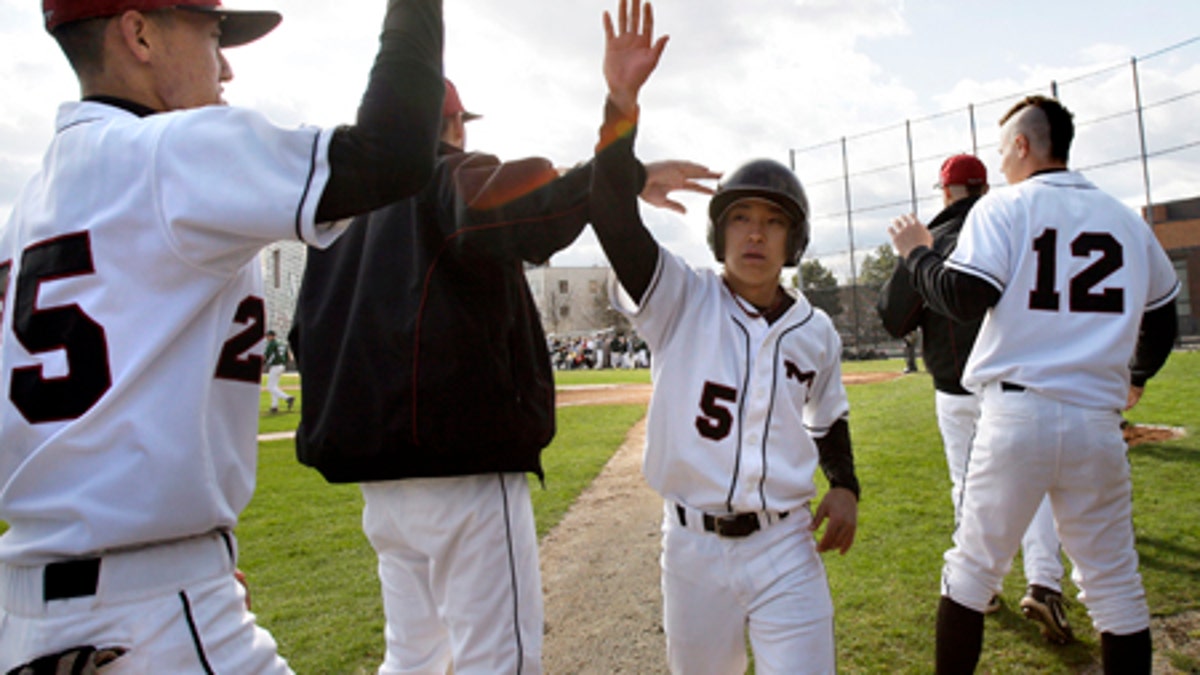
April, 23, 2009: Massachusetts Institute of Technology baseball players celebrate scoring a run in a game against Babson College. (AP)
Name the college that sponsored 41 varsity sports this year, tying with Harvard for most in the country.
The answer is about the last school you'd think of: math and science powerhouse MIT, the university with perhaps the brainiest—and nerdiest—reputation in America.
The Engineers—yes, that's their nickname—shared the honor with their bigger, wealthier neighbor in Cambridge, Mass., and have long competed in everything from football to fencing, softball to squash.
That's going to change, though.
The Massachusetts Institute of Technology announced Thursday it is eliminating eight teams because of the sputtering economy. Gone are men's and women's hockey, men's and women's gymnastics, skiing, golf, pistol shooting and wrestling.
MIT joins the list of colleges dropping sports to counteract budget deficits. Northern Iowa is nixing baseball. So is Vermont, which is also canceling softball. Women's volleyball and men's soccer are done at Maine; men's track and women's swimming will be out at Pepperdine.
The cuts leave stunned athletes scrambling to figure out what to do with the years they expected to be filled with practices and games.
MIT students say the same intensity that drives them to embrace the school's brutal academics makes them want to compete in sports at the highest level they can.
"It's just tough to watch, to witness the 180-degree turn on something I viewed and I know a lot of other people do as part of the MIT culture," sophomore gymnast Jake Shapiro said.
The school's athletic program is Division III, which means no scholarships and a philosophy based on participation, not profit. The teams are regularly competitive in New England and sometimes make national tournaments. For instance, the men's basketball team made the second round of the NCAA Division III tournament this season. The pistol team won national championships in 2005 and 2007.
About 20 percent of MIT's more than 4,100 undergraduates—or about 800—compete on varsity teams, a fairly high level of participation.
"I think it's one of the things that makes MIT unique, because there's a stereotype that everyone at MIT is just a nerd sitting in their room doing work all day and playing with computers," said David Somach, a sophomore from Cleveland who is majoring in electrical engineering and computer science and had never been a competitive skier until he joined MIT's team. He said stories like his are the beauty of the college's athletic program.
"When people hear we have varsity pistol or varsity squash or varsity skiing, they think it's pretty neat at a school that has a stereotype of being a school that's focused on studying," he said. "They think it's neat that students live a balanced life."
Neil Judell, a former gymnast who graduated in 1976, said: "There's no way in hell I would've made it through that school without that kind of stress relief."
MIT's endowment, valued at close to $10 billion at the end of June, had lost up to 25 percent by the end of the year. The school is trying to cut as much as 15 percent of its spending over the next few years. The athletics and phys ed department needs to trim its budget by close to $500,000 annually, director Julie Soriero said.
In announcing which teams would be cut, MIT noted that it will continue to boast the most varsity sports in Division III.
The NCAA does not maintain a list of which schools sponsor the most programs; Harvard and MIT established the claim through their own research. According to the Ivy League, Princeton has 38 sports, Brown 37 and Cornell 36. Ohio State also has 36, and Stanford 35. MIT will drop to 33. Harvard is not dropping any sports.
MIT said it evaluated teams on such factors as costs, student interest, coaching turnover, availability of competition and the quality of practice facilities.
Not counting incoming freshmen, graduating seniors and dual-sport athletes, 63 students will be affected by the cuts, according to MIT. The school said it will help students look into starting a club team in their sport if one doesn't already exist.
Grant Kadokura, a sophomore mechanical engineering major from Cupertino, Calif., was on the wrestling team. Last week was MIT's campus preview weekend, when newly admitted students visit. Kadokura found himself struggling over what to tell high school wrestlers about a team he knew might not exist next year.
"I don't know how I'd function without it," he said.
